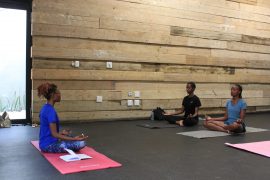Imagine a whole world of therapy and counselling and theories created without YOU in mind. Imagine the full essence of your you-ness being excluded from a process that is supposed to be healing and helpful and transformative? That doesn’t make a grain of sense does it? That’s what I thought until I came across Feminist Therapy.
In previous years, a lot of the theory and therapeutic process unfolded from the white male perspective and some of the theories in psychology have strong undertones of sexism and homophobia embedded in them. I hope, by now, we are all red-in-the-face-angry about this level of exclusivity, I know I was, but thankfully Feminist Therapy is not a mythological creature that leaves money in our shoes or presents under our Christmas trees. Feminist Therapy is very real and the best thing about it, is that it can be applied as the basic foundation in any therapeutic setting, regardless of how your therapist works, (ask about it) and it also encompasses an almost self-help theory that breeds empowerment, holistic well-being and healing.
The construct of feminist theory is gender-fair, multicultural, interactionist and takes on a life-span perspective. This theory can be internalised as a philosophy and a way of life that reinforces empowerment and wellbeing. It takes into account women’s issues, the role of race, sexuality as well as the social and political environment which can either contribute to our ability to be toxic and destructive or to thrive and flourish.
Some of the techniques and strategies that can be incorporated within a therapeutic setting be it in the form of the traditional sense of therapy where a psychologist will guide the process, or in the sense that therapy is a journey of the self, towards the true self, through the self.
Here are some of the techniques that you could use:
- Empowerment: Having the insight and ability to be an active agent of change and transformation for yourself and even for others. This has to do with finding your voice and holding onto it. Ask yourself “What is the most empowering thing I can do for myself” and explore the type of answers that come up for you. This question can hinder and break a cycle of powerlessness that you might be experiencing.
- Gender-Role Analysis: Think about how gender role expectations affect your well-being, ask yourself, “Does this specific role benefit me, my health and my well-being?” This type of analysis could help you decipher how much influence society might have on you and whether or not that is a process that serves you or which you’d like to continue. Your journey toward empowering yourself will also aid with gender-role analysis as your insights are followed by empowering action.
- Assertiveness Training: This type of training can help transcend stereotypical gender roles, alter negative beliefs and give rise to positive changes in your daily life. Assertive behavior can help you to negotiate that salary raise, promotion and set boundaries for how you wish to be treated by others.
You might find these techniques and strategies work for you, or you might not, (and that’s okay). I think the most important thing to keep in mind is to know that you have the power to come up with your own strategies and that you are the most important facilitator of your growth and personal transformation, regardless of which philosophy of life you follow.
- Beauty Boois, Psychological Counselor, Founder of @yogabybeauty & @NamMentalHealth, Blogger, Writer, Poet





